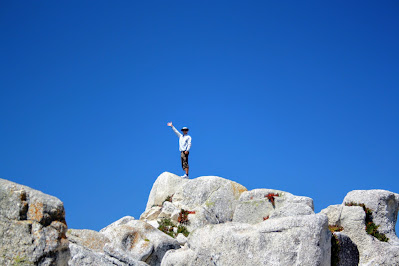Modern pedagogical (teaching) techniques centre around the process of learning, rather than the material. Thus the classroom experience is not substitutable with outside reading. The undergrad course I teach (ENVR 430, The Ecological Dimensions of Sustainability) therefore includes a grade for participation. But how to assess students' participation? And is there an opportunity for a deeper kind of learning?
 |
| The participation self-report template for ENVR 430. |
Hi folks,
I hope you're all basking in the glow of a semester nicely wrapped, already enjoying your holidays. Just a few words about your participation self-reports.
I bet that the majority of you were honest in your reports. I know that there were a bunch of you who were there week in and week out. Excellent. A few others were not fully honest. For some, this was clear from the spot-checks. For others, I have my suspicions.
I had this interesting conversation with my brother-in-law last night about free will. He argued that we can't really have free will because—apart from subatomic stochasticity (randomness)—what each of us does is a function of chemical reactions that means it's effectively determined by your biology plus your experiences. His conclusion was that we basically can't fault people for their transgressions, because in a sense, people couldn't do differently.
 |
| Conspicuous decisions about honesty and integrity can be life-altering, like forks in the road, or paths down a mountain ridge. |
I don't agree wholly, and the full rebuttal would take too long. But point is, I've been in those situations where you can feel the knife edge sharpness of a decision like you face on a mountain ridge, that would take you one way or another. And which way you go determines what you encounter, and who you believe yourself to be. It can shape your whole life.
I do agree with my brother-in-law that we often can't blame people, because we don't know what led them to their choices. Absolutely. I'm not judging any of you. Many of you were raised very differently than me, for sure. So honesty has a different meaning to you. But here's a plug for integrity *going forward*.
I want to boost as many of you as I can, in your future careers. I would want to write letters of reference for those who really put effort into this course. But anyone who was dishonest in this exercise can't get a full vote of confidence from me. I just can't do it and be true to myself. In aiming for an extra percent or two, they lost a much bigger chance.
But they have a different kind of a chance. They have the chance to make this the moment where they learned that there is *nothing* more valuable than your integrity. When you have good people vouching that you're a good person, you wouldn't believe how far that can take you. Psychological research has shown that little dishonesties set up people to be dishonest in many future events. The same is true when people redefine themselves as being honest.
So for the few of you who were less than fully honest, make this the moment where you realized that integrity is key to the whole endeavour, and where you redefine yourself as someone who is honest with honest people. Exercise your free will, and show that your future is not simply determined by your past actions.
 |
| I've made plenty of mistakes. But I pride myself on owning up to them. |
For those who were honest, thank you. You've already chosen one side of the mountain ridge. It's sunny on this side. ;)
I apologize for this last, unsolicited lecture. :) Every single one of you is poised to do great things (regardless of the choice just made)!
Happy holidays,
Kai

CHANS Lab Views by Kai Chan's lab is licensed under a Creative Commons Attribution-ShareAlike 4.0 International License.
Based on a work at https://chanslabviews.blogspot.com.

No comments:
Post a Comment